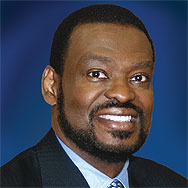
On March 2, 2008, high school senior Jamiel Shaw was gunned down in
Los Angeles. According to police, Shaw was walking home when two men he
had never met jumped out of a car and one shot him. A talented football
player, Shaw had scholarship offers from Stanford University and
Rutgers. The man who shot him was Petro Espinoza, an illegal immigrant
and member of a gang with a history of extensive violence against
African-Americans. According to the Los Angeles Times, “Espinoza had been released from jail 28 hours before the shooting, after serving time for an earlier [violent] offense.”
Why did the nation not mourn Jamiel the way we are mourning Trayvon?
Was it because the media knew immediately that Shaw’s killers were
Latino, not white?
The slaying of Trayvon Martin opened a Pandora’s box
of emotions in the black community. Blacks of my generation remember
all too well when one of our own could be lynched by whites, and law
enforcement would look the other way. Those were terrible times in our
nation’s history, and Trayvon’s death provoked many to assert that
nothing had changed.
I am deeply sympathetic to the outrage felt by blacks over this
tragedy, but I must point out that this is not our grandparents’ world.
Things have changed, as the most basic facts of this case reveal.
When this story broke, the media led us to believe that Trayvon had
been hunted down like a dog by a skinhead white supremacist gun nut. In
reality, Trayvon’s killer, like 16.3 percent of the United States’
population, is Latino. He is relatively light skinned, but hardly a
wealthy child of white privilege and certainly not a member of a Latino
gang known for violence against blacks, as Shaw’s killer was. To the
degree that race was involved in this crime, its involvement was
undoubtedly complex—far too complex for reporters determined to fit the
tragedy into their predetermined narrative.
For decades, both the media and politicians have tried to lump blacks
and Latinos together, as if individuals from both groups automatically
share common history and interests. Latinos are grouped with blacks far
more often than with Asian-Americans, even though they often share the
experience of immigration and learning English as a second language. Yet
an honest look at the slayings of Martin and Shaw challenge the notion
that blacks and Latinos are interchangeable minorities whose differences
aren’t worth noting or exploring.
Reality is far more complicated than most reporters or politicians
care to contemplate. For example, several studies have shown that when
immigration laws are enforced more strictly, black employment rises. The
simple fact is that many Latino immigrants undercut black wages in
lower-skilled jobs.
On the other hand, government quotas for minority-owned contracting
have been shown to discriminate against Latino-owned businesses in favor
of black-owned businesses. The Hispanic Chamber of Commerce recently
filed a complaint in Milwaukee alleging that they were being punished
for their industry and success. This doesn’t even begin to explore the
competition for college admissions spots made more complex by racial
quotas.
As a pastor, I am proud to have blacks and Latinos worshipping side
by side in the churches that are part of my new network of churches
(International Communion of Evangelical Churches). I have learned on the
job that you cannot lump Puerto Ricans in with Mexicans or Guatemalans
any more than you can lump Nigerians in with Kenyans, or blacks from the
Bronx in with blacks from South Carolina.
Race relations are complicated, far more complicated than the “whites
oppressing blacks and others” narrative allows us to appreciate. There
is no cheap policy fix for racial ignorance and hatred, and I’ve learned
that the only way trust can be built between people of different
backgrounds is through meaningful dialogue and relationships.
Although race relations in the United States have a long way to go, Juan Williams rightly pointed out in the Wall Street Journal
that young black murder victims are far more likely to be killed by
other blacks than by members of other races. He correctly calls the
entertainment industry to task for perpetuating the stereotype of young
black males as violent gangsters.
All of us can recognize that it is difficult for black crime victims
to find justice, whoever their assailants, and still know that there is
much work the black community needs to do on itself.
There are no easy answers in the Trayvon Martin
case—this was not Emmett Till, Part II. The black community has a
different set of challenges to face today than we did in the days of
lynching, and we will only make progress if we can face them honestly.
Bishop Harry R. Jackson Jr. is the senior
pastor of Hope Christian Church, a 3,000-member congregation in the
Washington, D.C., area. He is also the guest editor of the
January-February 2012 issue of Ministry Today about social
transformation.











































